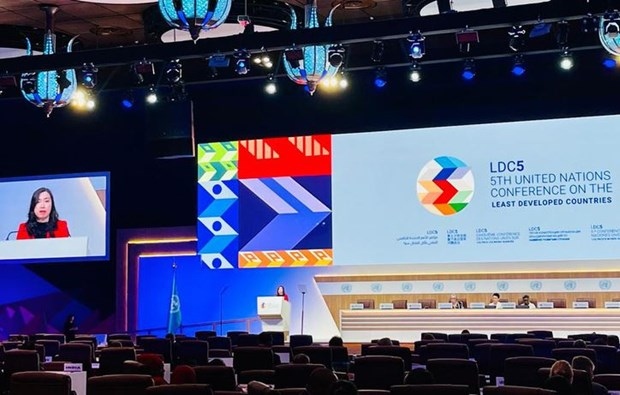Vietnam puts forward development initiatives at UN conference on least developed countries
VOV.VN - Vietnam has proposed ways of improving the internal capacity and national competitiveness of the world’s least developed countries, taking into account their strengths and characteristics, while also promoting the growth engine of trade and integration.

Vietnamese Deputy Minister of Foreign Affairs Le Thi Thu Hang made the proposals at the fifth United Nations conference of the world’s least developed countries (LDC) that is currently taking place in Doha, Qatar, from March 5 to 9.
She said the multilateral trading system should be maintained in a rules-based, fair, transparent, and inclusive manner, adding that it’s important to further enhance market access for LDCs.
The Vietnamese diplomat stressed the need to promote science-technology and innovation in order to create breakthroughs for growth. She called on developed countries to help transfer technology, improve capacity, and financially support LDCs who are in the process of green transition and carbon emissions reduction.
She went on to call on countries to uphold the role of peace, international co-operation, and partnerships in addressing global challenges.
On this occasion, Deputy Minister Hang shared Vietnam’s socio-economic development experience, with a specific focus on combining internal resources and external forces, proactively integrating into the world, as well as putting people at the centre of the development process.
Vietnam is willing to play a role as a co-operation bridge between development partners and LDCs, especially through the South-South and tripartite co-operation models, she affirmed.
The fifth LDC conference was attended by approximately 5,000 delegates, including many heads of state, senior leaders of LDC countries, the Secretary-General and President of the UN General Assembly, leaders of many international organisations, academia, the press, and the business community.
Delegates examined the implementation of the Istanbul Programme of Action since 2011 and set orientations and priorities for co-operation in the 2023 - 2031 period with the aim of helping LDCs to swiftly leave the group and properly implement the 2030 Sustainable Development Goals (SDG) roadmap.
LDCs worldwide are in a race against time to deliver the SDG goals by 2030. The remaining years must strive to usher in a new global partnership that ensures 46 countries benefit from social, economic, and environmental development.
The conference adopted the Doha declaration, affirming its strong commitment to implementing the Doha Programme of Action adopted by the UN General Assembly in March 2022. They set out priorities focusing on investing in people, promoting science-technology and innovation for sustainable development, turning economic restructuring into a driving force for growth and prosperity, strengthening both international trade and regional integration of LDC countries, responding to climate change, enhancing resilience to shocks, and seeking to strengthen global partnerships.
While staying in Doha, the Vietnamese diplomat held meetings alongside lead delegates of bilateral and multilateral partners such as Cuba, India, Benin, Uganda, eSwatini, Venezuela, Kazakhstan, Venezuela, the World Bank, and UNESCO.
Meeting with Cuban Minister of Foreign Trade and Investment Rodrigo Malmierca Diaz, Deputy Minister Hang emphasised that Vietnam attaches great importance to the special traditional relationship with Cuba. She voiced Vietnam’s strong support for Cuba to successfully assume the G77 presidency in 2023.
At a meeting with Indian Minister of External Affairs Subrahmanyam Jaishankar, Deputy Minister Hang suggested that the two countries increase the exchange of delegations at all levels, enhance economic connectivity, and promote cooperation in trade, investment, and tourism.
Meeting with representative of the African countries taking part in the conference, Deputy Minister Hang assured that Vietnam will promote the South-South and tripartite cooperation models in the field of agriculture and food security.
